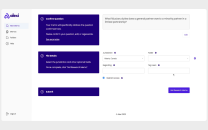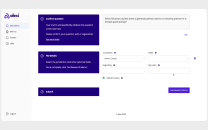
Alexi
Founded Year
2017Stage
Debt | AliveTotal Raised
$14.16MLast Raised
$3.14M | 7 mos agoMosaic Score The Mosaic Score is an algorithm that measures the overall financial health and market potential of private companies.
+16 points in the past 30 days
About Alexi
Alexi specializes in generative artificial intelligence (AI) for the legal sector. It focuses on enhancing litigation processes. The company offers AI enabled solutions that generate legal research memos, assist in litigation argument brainstorming, and automate routine litigation tasks. Alexi primarily serves law firms of various sizes and in-house legal teams. It was founded in 2017 and is based in Toronto, Canada.
Loading...
Alexi's Product Videos


Alexi's Products & Differentiators
Alexi Research Memo
AI-powered legal research memo answering almost any objective legal question.
Loading...
Expert Collections containing Alexi
Expert Collections are analyst-curated lists that highlight the companies you need to know in the most important technology spaces.
Alexi is included in 2 Expert Collections, including Artificial Intelligence.
Artificial Intelligence
12,626 items
Companies developing artificial intelligence solutions, including cross-industry applications, industry-specific products, and AI infrastructure solutions.
Generative AI
2,807 items
Companies working on generative AI applications and infrastructure.
Latest Alexi News
Sep 9, 2025
By Owen Guo | September 09, 2025 With more and more students relying on tools such as ChatGPT, educators and institutions are developing new strategies to smartly — and safely — engage with the technology. A college student, bleary-eyed and overcaffeinated, slouches over her desk. Racing to finish her essay, she turns to ChatGPT, which instantly flags typos and formatting issues that might escape even the sharpest eyes. But consider this scenario unfolding against a darker backdrop. As generative AI expands its scope, our collective critical thinking skills begin to atrophy. Plagiarism and misinformation spread unchecked. The very tools designed to enhance learning may, ironically, undermine it. Welcome to the AI debate echoing through the halls of higher education. As classes resume this fall, Canadian universities are wrestling with a pressing challenge: balancing AI’s vast potential against such concerns as academic misconduct and skill erosion. Robert Clapperton, a professor at Toronto Metropolitan University who studies AI in education, says that the technology’s growing reach is compelling more people to engage with it. “We have this behemoth of a tool and we need to figure out a way to corral and harness it,” he says. A co-founder of the AI-powered education platform Ametros Learning , Clapperton has embraced generative AI in the classroom. This fall, he is using it in a research methods course to help drive in-class group work. Clapperton says the technology has made him more productive as a professor. “The question is,” he adds. “How do we teach with AI so it can become a collaborative agent for students?” AI on campus A 2024 poll by KPMG found that 59 percent of Canadian post-secondary students reported using generative AI for schoolwork, up from 53 percent a year earlier. The most common uses included brainstorming, research and summarizing information. And students aren’t the only ones leveraging the technology. A recent Conference Board of Canada survey showed widespread support among educators for using AI in school. Nearly three years after ChatGPT’s debut, many Canadian universities have developed detailed guidelines on AI use. The University of Toronto aims to become an “AI-ready institution” with a “robust, flexible and responsive” technological ecosystem. McGill permits AI use in certain instances, but warns against overreliance, comparing it to learning to drive by just watching from the sidewalk. Meanwhile, the University of Waterloo will stop using an AI detection tool this September, citing inaccuracy and potential bias against non-native English speakers. The push to refine classroom policies reflects both the transformative power of this technology and its inherent challenges. Rapid advances in AI are upending traditional student assessments, from exams to essay writing. Some Canadian universities have reinstated in-person written exams amid concerns about AI-assisted cheating. At the same time, certain courses focused on career readiness risk losing their appeal. Just ask recent computer science graduates, many of whom have struggled to land entry-level coding jobs increasingly automated by AI. Even law schools — long considered cloistered institutions slow to change — are adapting. At the University of British Columbia , law students working at legal clinics can now use an AI-powered tool to help develop sharper legal advice to people who cannot afford counsel. A further indication that AI is gaining traction in legal education: York University’s Osgoode Law School launched a search for a professor of artificial intelligence and the future of law earlier this year. Mark Doble, the CEO of Toronto-based legal software firm Alexi , sees generative AI as a transformative tutor for students. Help with interpretation of case law? Check. Drafting and translating documents? Check. In his view, the technology has the potential to allow students to focus on higher-order skills. Take articling, a longstanding rite of passage for aspiring lawyers. Doble believes AI will reshape the experience but won’t make it obsolete. “Law school is very academic. Articling is less so but still focuses on fundamental principles with more traditional pedagogy,” he says. “With AI, articling students will be able to focus more directly on client outcomes and learn about relationship building and strategy.” Still, he cautions against “throwing AI at everything.” Ultimately, AI should complement — not replace — learning. Doble recalls a recent conversation with a Canadian law school dean who saw parallels in how calculators shaped math education. Students may no longer need to do long division by hand, but they still need to understand how it works conceptually. Efficiency booster or gateway to passive learning? For students like Alex Davis, a postdoctoral researcher at the University of Toronto, AI remains a powerful tool to boost efficiency. A specialist who studies the electronic properties of industrial materials, Davis often writes code to run statistical analyses and generate data-packed charts and diagrams. When his code hits a snag, he usually consults ChatGPT. “Half the time, it can figure it out,” he says. Davis, who has a paid ChatGPT subscription, also uses generative AI to find academic papers, a task he once left to Google Scholar. In his experience, the tool handles vague queries better, surfacing studies Google might miss. Still, Davis is no blind adherent. “When I get a research link, I’ll check the original paper,” he says. “ And I don’t have to trust the code ChatGPT produces. I can just run it and see what happens.” Although there are clear benefits to capitalizing on the technology’s strengths — as Davis notes, outsourcing onerous tasks such as troubleshooting and data-sourcing has freed up more time to focus on research — some experts worry that AI may undermine our ability to learn. Bonnie Stewart , a professor who specializes in digital learning at the University of Windsor, warns that generative AI may encourage “passive” and “transactional” learning. The technology should not be mistaken for a tool that opens new horizons in human knowledge, she stresses — rather, it can be thought of as a fishing trawler scouring the vast ocean of “what has already been thought and said.” When we use this framework “to steer us from the processes and hard work of meaning-making, there will be cognitive impacts,” Stewart adds. “AI can help us do things, but getting things done is not necessarily learning.” Research backs that up. In a 2025 study involving more than 4,500 participants, researchers at the University of Pennsylvania found that those who used large language models to research topics demonstrated shallower understanding of those subjects and generated fewer original insights than people who relied on traditional web search. Tailoring learning to students As Robert Clapperton notes, given the staying power of this technology, attempts to make classrooms “AI-proof” would be futile. The question is no longer whether to use AI, but how. Brad Cohen, chief academic officer at Top Hat , a Toronto-based educational software company, regularly meets with educators across North America to discuss their concerns about the technology. “Many universities have invested resources to help faculty come to terms with AI and to help them understand what AI is and what it can do for them,” says Cohen, who believes generative AI’s greatest promise lies in its potential to create learning environments closely attuned to individual student needs, making learning more accessible, immersive and deeply personal. With AI, he notes, educators can better identify knowledge gaps among students and tailor course design to accommodate diverse learning styles. “Most faculty see AI as an essential tool for the future and want to help students learn how to use it ethically and responsibly,” he says. “Ultimately, we are all aiming for a learning environment where every student has the best possible chance to succeed.” Owen Guo Enter your email*
Alexi Frequently Asked Questions (FAQ)
When was Alexi founded?
Alexi was founded in 2017.
Where is Alexi's headquarters?
Alexi's headquarters is located at 40 King Street West, Toronto.
What is Alexi's latest funding round?
Alexi's latest funding round is Debt.
How much did Alexi raise?
Alexi raised a total of $14.16M.
Who are the investors of Alexi?
Investors of Alexi include Toronto-Dominion Bank, Draper Associates, Drive Capital, ff Venture Capital, Creative Destruction Lab and 3 more.
Who are Alexi's competitors?
Competitors of Alexi include Harvey, Legora, Ex Nunc Intelligence, Lexroom, Eudia and 7 more.
What products does Alexi offer?
Alexi's products include Alexi Research Memo.
Who are Alexi's customers?
Customers of Alexi include Gowling WLG and Oatley Vigmond.
Loading...
Compare Alexi to Competitors

Harvey specializes in domain-specific artificial intelligence for the legal and professional services sectors. The company provides products for tasks such as contract analysis, due diligence, compliance, and litigation. Its solutions are used by global law firms and Fortune 500 enterprises. The company was founded in 2022 and is based in San Francisco, California.
CaseMine is a legal technology company focused on leveraging artificial intelligence to enhance legal research and case analysis. Its main offerings include an AI-powered legal research platform that assists legal professionals in finding relevant case laws and statutes, and an AI legal assistant named AMICUS that provides strategic guidance and accurate answers to legal queries. The company primarily serves legal professionals seeking efficient research tools and case management solutions. It was founded in 2014 and is based in Noida, India.

Eudia focuses on augmented intelligence for legal teams within the enterprise sector. Their main offering is an AI-driven platform that provides insights from contracts and legal data, which aims to assist enterprise legal departments. Eudia primarily serves Fortune 500 legal teams. It was founded in 2023 and is based in San Francisco, California.
Lexroom assists with legal research and drafting within the legal industry. The company provides an AI assistant that allows legal professionals to conduct research, draft documents, and analyze legal information. Lexroom serves the legal sector, offering tools to support the workflow of lawyers and legal teams. It was founded in 2023 and is based in Milan, Italy.

Eve provides legal artificial intelligence solutions for plaintiff law firms. The offerings include artificial intelligence (AI) powered tools for case intake, medical overviews, drafting legal documents, and managing discovery processes, aiming to streamline the legal workflow from intake to litigation. Eve's technology is designed to improve the efficiency of legal practices, allowing firms to handle cases with speed and accuracy. It was founded in 2023 and is based in Redwood City, California.

LegalMation provides artificial intelligence solutions for the legal sector, focusing on litigation and dispute resolution. The company offers tools that assist in the creation of legal documents such as responsive pleadings, discovery requests, and demand letters, along with analytics and matter profiling to support legal workflows. LegalMation serves corporate legal departments, law firms, and insurance companies. It was founded in 2017 and is based in Los Angeles, California.
Loading...
